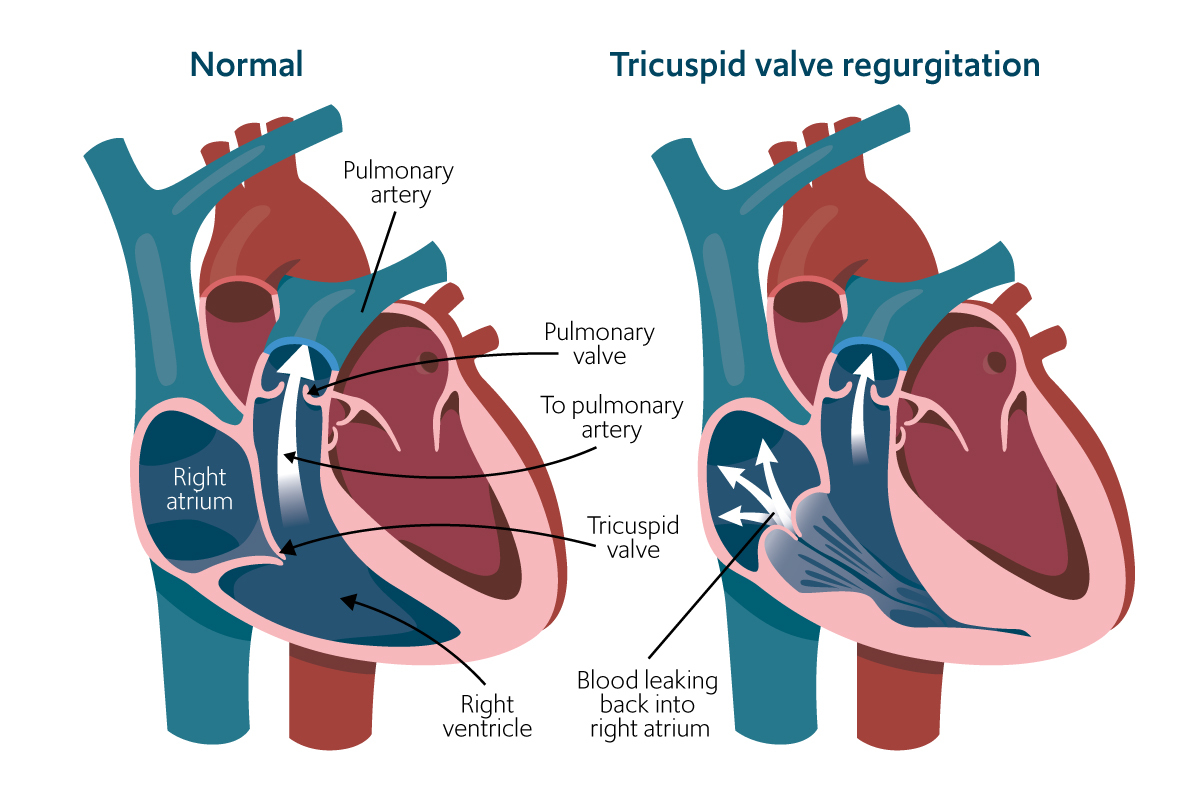Tricuspid valve regurgitation happens when the tricuspid valve of your heart doesn’t close properly, which leads to blood flowing backwards and your heart working harder to pump blood forward towards the lungs. Over time, this can lead to damage to your heart and other health problems.
Our heart specialists offer a minimally invasive treatment for the condition at our hospitals that can target treatment directly to where it is needed in the tricuspid valve without open heart surgery. This treatment option greatly increases the quality of life of patients who can’t have surgery.
What is tricuspid valve regurgitation?
Tricuspid valve regurgitation is a disease of your heart’s tricuspid valve,
“A faulty tricuspid valve causes blood to leak backwards and makes it more difficult for your heart to pump blood,” explains our consultant interventional cardiologist, Dr Rob Smith.
“If left untreated, this can lead to heart failure in the right side of your heart and other health problems.”
which is important in preventing the backflow of blood as it travels through the heart and into the lungs to be oxygenated.

With tricuspid valve regurgitation, the tricuspid valve which is located between the two right heart chambers (right ventricle and right atrium) doesn’t close properly.
What is tricuspid valve regurgitation caused by?
There are two main types of tricuspid valve regurgitation which are each caused by a range of factors.
- functional (also called secondary) tricuspid valve regurgitation: This is the most common form and happens due to other diseases or conditions, such as a heart rhythm problem
- degenerative (also called primary) tricuspid valve regurgitation: This is less common and is not caused by another disease or condition. For example, it can be due to congenital heart disease – a heart defect at birth
Patients are classified as having mild, moderate or severe tricuspid valve regurgitation.
The condition is more common in older people – particularly over the age of 65 – and women develop the severe form of tricuspid valve regurgitation more often than men.
What are the symptoms of tricuspid valve regurgitation?
The condition does not often cause symptoms until it is severe. This means that many patients with the condition don’t experience symptoms.
One study showed that of those aged 65 and over with tricuspid valve regurgitation, 97% of patients did not report any symptoms.
If you do experience symptoms, you may experience fatigue (feeling tired), a reduced ability to exercise, breathlessness, dizziness and swelling in the abdomen, legs, ankles and/or feet.
However, these symptoms are not specific to this condition and you should speak to your doctor if you are concerned.
How is tricuspid valve regurgitation diagnosed?
There are a range of diagnostic heart tests that can be performed to help diagnose tricuspid valve regurgitation.
This can include an electrocardiogram (which detects problems with the rhythm of your heart), an echocardiogram (which detects problems with the structure of your heart) and/or a cardiac MRI (which creates detailed images of your heart to determine how severe the tricuspid valve regurgitation is).
As many patients don’t experience symptoms of tricuspid valve regurgitation, it can be discovered during routine examinations of the heart when your doctor is not specifically looking for it.
How is tricuspid valve regurgitation treated?
Treatment of tricuspid valve regurgitation can involve a range of options and depend on how severe it is.
Medication
Medical treatments can help control some of the symptoms experienced with tricuspid valve regurgitation but cannot cure it. This can include medications to treat high blood pressure, an irregular heart rhythm and/or swelling in your abdomen, arms and/or legs.
Surgery
Tricuspid valve repair or replacement may be recommended, which is performed as open-heart surgery so your surgeon can access your tricuspid valve directly. In valve replacement, a biological (from humans, pigs or cows) or mechanical valve may be used. Your surgeon will discuss the best option for you.
As severe tricuspid valve regurgitation is more common in older patients where open-heart surgery can be higher risk, a minimally invasive catheter-based procedure may be recommended instead.
Minimally invasive catheter-based procedure
“A catheter-based procedure to treat tricuspid valve regurgitation is fairly new and we have recently started offering it at our hospitals,” explains Dr Smith.
This minimally invasive procedure involves a catheter – a tube-like device – being directed to your heart via a very small incision in your groin to deliver the treatment.
This treatment is a leaflet repair apparatus that attaches to the tricuspid valve leaflets and helps them to seal correctly. This helps correct the problem of tricuspid valve regurgitation.
“We have seen impressive results in our patients who had no alternative surgical treatment option and hope to offer the procedure to more patients who are in a similar situation and may benefit,” says Dr Smith.

(A) The Edwards PASCAL transcatheter valve repair system, with the PASCAL Ace implant and (B) the Abbott TriClip Transcatheter Tricuspid Valve Repair system offer our interventional cardiologists a wide range of leaflet repair implants that can be delivered via a catheter, to ensure we can provide minimally invasive treatment uniquely tailored to each patient.
How long does it take to recover from tricuspid valve replacement or repair?
The recovery time for tricuspid valve repair or replacement depends on the approach used.
- surgery: Tricuspid valve repair or replacement completed with surgery normally involve a hospital stay of several days. The total recovery time is usually a few weeks
- minimally invasive catheter-based procedure: Most patients who have a catheter-based procedure to treat tricuspid valve regurgitation can return home the next or a couple days after the procedure. Most then return to their regular routines shortly after
Contact us
To find out more about our treatments for tricuspid valve regurgitation, please contact our team.

